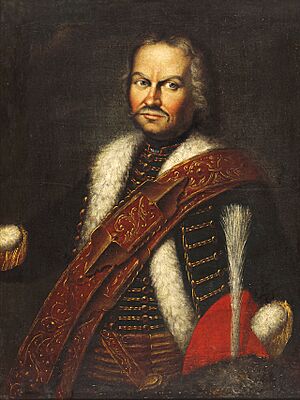Baron Franz von der Trenck facts for kids
Quick facts for kids
Baron Franz von der Trenck
|
|
|---|---|

Baron Franz von der Trenck
|
|
| Born | February 1, 1711 Reggio di Calabria |
| Died | October 4, 1749 (aged 38) Brno |
| Allegiance | |
Baron Franz von der Trenck (German: Franz Freiherr von der Trenck, Croatian: Barun Franjo Trenk) was an Austrian soldier. He was born on January 1, 1711, in Reggio di Calabria, Italy, and died on October 4, 1749, in Brno. Trenck became famous as the leader of a special group of soldiers called pandurs during the 18th century.
Contents
Early Life and Family
Franz von der Trenck was born into a military family on January 1, 1711. His father, Johann Heinrich von der Trenck, was an Austrian officer. Franz was born in Reggio, a city in southern Italy.
Even though he was born in Italy, his family was from Pomerania, a region in what is now Germany and Poland. He also had large land estates in Croatia. Because his father's job meant moving often, Franz spent his childhood in Italy, Croatia, and Hungary. He received his education from the Jesuits in a town called Ödenburg.
Starting a Military Career
Trenck joined the Imperial Army in 1728. However, he left the army three years later. He decided to live a quiet life in Požega, a town in Croatia. He got married and lived on his land for a few years.
Sadly, his wife died during a serious illness known as the Great Plague of 1738. After this, Trenck wanted to return to military service. He offered to create a special group of soldiers called pandurs to fight against the Turks. This offer was not accepted at first.
Service in Russia
After his offer was refused, Trenck joined the Imperial Russian Army. He worked as a mercenary, which means he was a soldier who fought for money. In Russia, he became friends with Ernst Gideon von Laudon, who would also become a famous military leader.
Trenck fought against the Turks and Tatars in the Russo-Turkish War (1735–1739). He served as a captain and later a major in the cavalry. However, he was known for being disobedient and sometimes harsh. He was accused of bad behavior and not following orders. He even faced a very serious punishment, but his sentence was changed. He was removed from his rank and put in prison for a short time.
Return to Austria
After his time in Russia, Trenck went back to Austria. His father was in charge of a small fortress there. However, Trenck often got into arguments with people. He even sought safety in a religious building in Vienna.
Prince Charles Alexander of Lorraine became interested in Trenck. He helped Trenck get a fresh start and a new position in a special group of soldiers. In this role, Trenck showed great personal bravery, even though he was still known for his difficult personality. His skills as a soldier were so valuable that he was promoted. He became a lieutenant colonel in 1743 and a colonel in 1744.
Trenck's Pandurs
Trenck became most famous during the War of the Austrian Succession. He led a unit of pandurs, who were like special forces. These soldiers were very good at frontier warfare, using surprise attacks and quick raids. Trenck mainly recruited Croatian fighters for his unit. These were experienced soldiers from the border areas between Austria and the Ottoman Empire.
Trenck's Pandurs became well-known for their tough fighting style. They were very effective in battle. However, they also gained a reputation for being very harsh, and sometimes caused trouble for civilians.
When the War of the Austrian Succession began, Trenck gathered volunteers and marched to Vienna to help Maria Theresa, the ruler of Austria. His Pandurs marched through the streets of Vienna before heading to fight in Prussia.
During the Battle of Soor, Trenck and his irregular troops focused on taking valuable items instead of fighting. Because of this, Trenck was accused of allowing King Frederick the Great of Prussia to escape.
Imprisonment and Death
Later, Trenck was brought before a military court in Vienna. He was accused of several serious things. These included selling military positions without permission and punishing his soldiers without following military rules. He was also accused of claiming pay for soldiers who didn't exist.
While some flexibility was allowed for leaders of irregular troops, Trenck had gone too far. His harsh actions and robberies had made him disliked across Austria. He was found guilty and given a very serious sentence. However, there were concerns about how fair his trial was. Because of this, the Empress changed his sentence. He was removed from his military rank and put in prison.
Trenck spent the rest of his life in a mild captivity at Spielberg fortress in Brno. He died there on October 4, 1749. In his last will, he left a large sum of money to the town of Marienburg. This town had been badly damaged by his troops during the war.
Today, Trenck's mummified body can be seen in the crypt of the Capuchin Monastery in Brno.
 | William M. Jackson |
 | Juan E. Gilbert |
 | Neil deGrasse Tyson |

